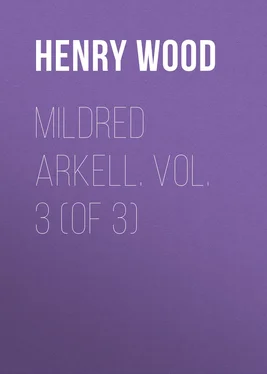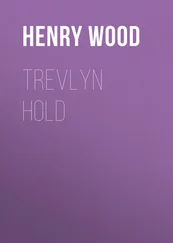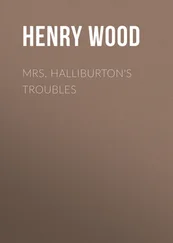Henry Wood - Mildred Arkell. Vol. 3 (of 3)
Здесь есть возможность читать онлайн «Henry Wood - Mildred Arkell. Vol. 3 (of 3)» — ознакомительный отрывок электронной книги совершенно бесплатно, а после прочтения отрывка купить полную версию. В некоторых случаях можно слушать аудио, скачать через торрент в формате fb2 и присутствует краткое содержание. Жанр: foreign_sf, literature_19, foreign_antique, foreign_prose, на английском языке. Описание произведения, (предисловие) а так же отзывы посетителей доступны на портале библиотеки ЛибКат.
- Название:Mildred Arkell. Vol. 3 (of 3)
- Автор:
- Жанр:
- Год:неизвестен
- ISBN:нет данных
- Рейтинг книги:5 / 5. Голосов: 1
-
Избранное:Добавить в избранное
- Отзывы:
-
Ваша оценка:
- 100
- 1
- 2
- 3
- 4
- 5
Mildred Arkell. Vol. 3 (of 3): краткое содержание, описание и аннотация
Предлагаем к чтению аннотацию, описание, краткое содержание или предисловие (зависит от того, что написал сам автор книги «Mildred Arkell. Vol. 3 (of 3)»). Если вы не нашли необходимую информацию о книге — напишите в комментариях, мы постараемся отыскать её.
Mildred Arkell. Vol. 3 (of 3) — читать онлайн ознакомительный отрывок
Ниже представлен текст книги, разбитый по страницам. Система сохранения места последней прочитанной страницы, позволяет с удобством читать онлайн бесплатно книгу «Mildred Arkell. Vol. 3 (of 3)», без необходимости каждый раз заново искать на чём Вы остановились. Поставьте закладку, и сможете в любой момент перейти на страницу, на которой закончили чтение.
Интервал:
Закладка:
"Allow me to go down at once to St. James's, sir," resumed Omer.
"I will go with you," said Mr. Fauntleroy. The truth was, he was ill at ease.
They proceeded together to St. James's church, causing old Hunt to believe that Lawyer Fauntleroy and his establishment of clerks had all gone crazy together. "Search the register three times in one day!" muttered he; "nobody has never done such a thing in the memory of man."
But neither Omer nor his master, Mr. Fauntleroy, could find any such entry in the register.
CHAPTER III.
DETECTION
Afternoon school was over. Mr. Wilberforce had been some time at home, and was bestowing a sharp lecture on his son Edwin for some delinquency, when he was told that Lawyer Fauntleroy waited in his study. The master brought his anger to a summary conclusion, and went into the presence of his visitor.
"My business is not of a pleasant nature," he premised. "I must tell you in confidence, Mr. Wilberforce, that after all the doubt and discredit cast upon the affair, Robert Carr was discovered to have married that girl at St. James's—your church now—and the entry was found there."
"I know it," said Mr. Wilberforce. "I saw it in the register."
The lawyer stared. "Just repeat that, will you?" said he, putting his hand to his ear as if he were deaf.
"I heard it was to be found there, and the first time afterwards that I had occasion to make an entry in the register, I turned back to the date, out of curiosity, and read it."
"Now I am as pleased to hear you say that as if you had put me down a five-hundred pound note," cried Mr. Fauntleroy. "I daresay you'll not object, if called upon, to bear testimony that the marriage was registered there."
"The register itself will be the best testimony," observed Mr. Wilberforce.
"It would have been," said the lawyer; "but that entry has been taken out of the register."
"Taken out!" repeated Mr. Wilberforce.
"Taken out. It is not in now."
"Stuff and nonsense!" cried the master.
"So I said, when my clerks brought me word to-day that it was not in. The first sent, Green—you know the young dandy; it's but the other day he was in the college school—came back and said it was not there. Kenneth gave him a rowing for carelessness, and went himself. He came back and said it was not there. Then I thought it was time to go; and I went, and took Omer with me, who saw the entry in the book last November, and copied part of it. Green was right, and Kenneth was right; there is no such entry there."
"This is an incredible tale," exclaimed Mr. Wilberforce.
The old lawyer drew forward his chair, and peered into the rector's face. "There has been some devilry at work—saving your calling."
"Not saving it at all," retorted Mr. Wilberforce, as hot as when he had been practically demonstrating of what birch is made in the college schoolroom. "Devilry has been at work, in one sense or another, and nothing short of devilry, if it be as you say."
"It has not only gone, but there's no trace of it's going, or how it went. The register looks as smooth and complete as though it had never been in any hands but honest ones. But now," added the lawyer, "there's another thing that is puzzling me almost as much as the disappearance itself; and that is, how you got to know of it."
"I heard of it from Travice Arkell."
"From Travice Arkell!"
"Yes, I did. And the way I came to hear of it was rather curious," continued the master. "One of my parishioners was thought to be dying, and I was sent for in a hurry, out of early school. Mr. Prattleton generally attends these calls for me, but this poor man had expressed a wish that I myself should go to him. It was between eight and nine o'clock, and Travice Arkell was standing at their gates as I passed, reading a letter which the postman had just delivered to him. It was from Mrs. Dundyke, with whom the Carrs were stopping–"
"When was this?" interrupted Mr. Fauntleroy.
"The beginning of November. Travice Arkell stopped me to tell of the strange news that the letter conveyed to him; that a paper had been found in Robert Carr the elder's writing, stating that the marriage had taken place at St. James the Less, the morning he and Miss Hughes left Westerbury, and it would be found duly entered in the register. The news appeared to me so excessively improbable, that I cautioned Travice Arkell against speaking of it, and recommended him to keep it to himself until the truth or falsehood of it should be ascertained."
"What made you give him this caution?"
"I tell you; I thought it so improbable that any such marriage should have taken place. I thought it a hoax, set afloat out of mischief, probably by the Carrs of Eckford; and I did not choose that my church, or anything in it, should be made a jest of publicly. Travice Arkell agreed with my view, and gave me his promise not to mention it. His father was away at the time."
"Where?"
"I really forget. I know he had come home only the day before from a short visit to London, and went out again, somewhere the same day. Travice said he did not expect him back that second time for some days."
"Well?" said Mr. Fauntleroy, in his blunt manner, for the master had stopped, in thought.
"Well, the next morning Travice Arkell called upon me here. He had had a second letter from Mrs. Dundyke, begging him not to mention to anyone what she had said about the marriage, for Mrs. Carr had received a hasty letter from Mr. Fauntleroy, forbidding her to speak of it to anyone. So, after all, that caution that I gave to Travice might have been an instinct."
"And do you think he had not mentioned it?"
"I feel sure that he has never allowed it to escape his lips. He has too great a regard for his aunt, Mrs. Dundyke. She feared she had done mischief, and was most anxious. On the following Sunday, when I was marrying a couple in my church before service, and had got the register out, I looked back to the date, and there, sure enough, was the marriage duly entered."
"And you have not spoken of it?"
"I have not. If, as you say, the marriage is no longer there, it is a most strange thing; an incredible thing. But I'll see into it."
"Somebody must see into it," returned the lawyer, as he departed. "A parish register ought to be kept as sacred as the crown jewels."
Mr. Wilberforce—a restless man when anything troubled him—started off to Clark Hunt's, disturbing that gentleman at his tea. "Hunt, follow me," said he, as he took the key from its niche, "and bring some matches and a candle with you. I want to examine the register."
"If ever I met with the like o' this!" cried Hunt, when the master had walked on. "Register, register, register! my legs is aching with the tramping back'ards and for'ards, to that vestry to-day."
He walked after Mr. Wilberforce as quickly as his lameness would allow. The latter was already in the vestry. He procured the key of the safe (kept in a secret place which no one knew of save himself, the clerk, and the Reverend Mr. Prattleton) opened it, and laid the book before him. Mr. Wilberforce knew, by the date, where the entry ought to be, where it had been, and he was not many minutes ascertaining that it was no longer there.
"Gone and left no trace, as Fauntleroy said," he whispered to himself. "How can it have been done? The leaf must have been taken out! oh yes, it's as complete a thing as ever I saw accomplished: and how is it to be proved that it's gone? This comes of their careless habit of not paging their leaves in those old days: had they been paged, the theft would have been evident. Hunt," cried he, aloud, raising his head, "this register has been tampered with."
"Law, sir, that's just what that great lawyer, Fauntleroy, wanted to persuade me on. He has been a-putting it into your head, maybe; but don't you be frighted with any such notion, sir. 'Rob the register!' says I to him; 'no, not unless they robs me of my eyesight first. It's never touched, nor looked at,' says I, 'but when I'm here to take care on it.'"
Читать дальшеИнтервал:
Закладка:
Похожие книги на «Mildred Arkell. Vol. 3 (of 3)»
Представляем Вашему вниманию похожие книги на «Mildred Arkell. Vol. 3 (of 3)» списком для выбора. Мы отобрали схожую по названию и смыслу литературу в надежде предоставить читателям больше вариантов отыскать новые, интересные, ещё непрочитанные произведения.
Обсуждение, отзывы о книге «Mildred Arkell. Vol. 3 (of 3)» и просто собственные мнения читателей. Оставьте ваши комментарии, напишите, что Вы думаете о произведении, его смысле или главных героях. Укажите что конкретно понравилось, а что нет, и почему Вы так считаете.












